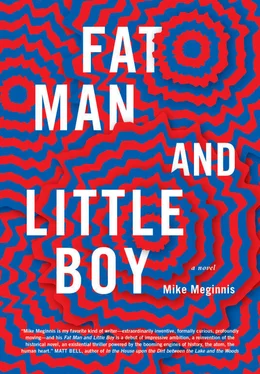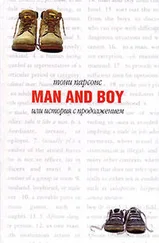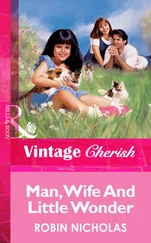He drove home planning to let himself be arrested. This was, after all, what he had wanted, even planned. They would put him away for as long as the law said he deserved for as close as they could come to the number of killings he had in some sense committed. But now that the ax was falling he feared for his neck. When he came in the door of his cabin and saw Rosie playing marbles with their daughter he said, “We’re going to Hollywood!” big and happy as he could, waving his arms in wild circles.
When she asked him why he said they deserved it. When she asked him why again he said he wanted to see where magic was made. He had grown to love the cinema more than almost anything. His interests had expanded from films featuring the Hanway twins to a series of noirs, detective films, and gangster flicks. Rosie called them his tough-guy pictures. There was something to it. Fat Man had skipped adolescence for a cushy adulthood. He had never set a proper goal, never known for sure what he wanted, had always been soft, and was now at his softest: grotesquely overweight, a doting father, and an exceedingly grateful husband. Some nights he would sit up late thanking Rosie for loving him, wrapping himself around her, spooning her insistently. She found it alternately adorable and infuriating.
After dinner, Rosie asked him if it was the police that made him want to go to Hollywood. He asked her what made her think that. She told him a letter had come for him while he was gone. The envelope was a large brown one of the sort used to mail documents. It was heavy. There must have been a lot of paper inside. There was no return address.
“Open it,” she said.
He made to leave with the letter.
“Open it in front of me.”
Inside, a thick sheaf of papers bound by a straining yellow rubber band. He broke the rubber band with a yank of his hooked fingers. The papers were typewritten, the words crowding each other, not even single-spaced but overlapping slightly, so that p’s, y’s, and g’s intersected uppercase letters, so that l’s impaled what was above them. He understood, after some study, that these were names: the names of women. He flipped through the pages. There were so many, all with dates appended, going back and back, from now to several years before Fat Man and Little Boy even came to France.
“You never talk about your life before meeting me,” said Rosie.
“There’s nothing worth saying,” said Fat Man.
“You never told me why they won’t leave you alone.”
“They’re confused.”
“Who are all these women?”
“Dead women.”
“We’ll go to California. Whatever you’ve done, I want you safe.”
Tickets were bought. They stayed in a Paris hotel under false names while they waited for their flight. They told the staff they would be visiting Rosie’s family. Maggie was promised she would see where the movies were made, and Little Boy understood without being told that they would be fugitives for a while. Fat Man took Rosie out for dinner. They had the duck.
She asked him, “Did you do what they say you did?”
“No, not what they say.”
She asked him why he looked so guilty all the time.
He said he didn’t look guilty. He said he looked afraid.
“What are you afraid of?”
“Losing you.”
Now the rest of the Something-Burger sign comes into view. It reads ATOMIC BURGER, the glowing red text emblazoned on a neon-green rocket, launching from the joint at an angle. The windows are painted with cartoon mushroom clouds rising from cartoon burgers and shakes, low prices markered in yellow at landfall. Outside the door there’s a brightly-colored toy plane the kids can ride in for a quarter. A little girl sits in the cockpit, pretending to machine-gun her brother.
“Christ,” says Fat Man. He turns to Little Boy, still holding Maggie’s hand, and Rosie, who adjusts her hat to better block the sun.
“What?” she says. “You don’t want to go anymore?”
“Well it’s in pretty bad taste, don’t you think?”
“What is?”
He waves at the sign. “Atomic Burger. Why not just call it ‘We killed several hundred thousand innocent Japanese Burger’?”
“I guess,” says Rosie, still adjusting the brim of her hat. “I mean, I can tell you exactly why you wouldn’t do that, but I see your point. But I don’t think they mean it that way. It’s about the future.”
“The future,” says Fat Man, shaking his head.
She sighs. “Look, we can go somewhere else, you’re the one who said he’s starving.”
But Fat Man feels a pull. He turns to Little Boy for help. Little Boy looks back blankly. “No, no, it’s okay. Come on. I’m overreacting. You know how sensitive I get.”
“I suppose,” says his wife.
They go to Atomic Burger. The little girl in the toy plane machine-guns them as they go through the double doors. A bell rings; Fat Man jumps. A waitress tells them to sit anywhere they like. Her paper hat is shaped and painted like a boat—a destroyer. She wears a sort of futuristic stewardess uniform, a long blue skirt and short-sleeved jacket with neon green fringe, the rocket logo replicated on her right breast—a name tag: Charlene. All that and a pair of yellow vinyl cowboy boots. Rosie tugs him gently by his elbow to a booth. Little Boy and Maggie sit on one side, the grown-ups on the other. The kids kick their feet. Fat Man passes out the menus. The cover is a drawing of a droopy-faced dog piloting the plane outside, wearing flight goggles and a helmet. A small pink paper advertisement disguised as a coupon but offering no discount falls out of the menus when they open, inviting the reader to a used car lot five miles away, where the deals are wild and crazy and the cars all look new.
Fat Man presses his hand to his gut and adjusts it. “Smells good in here,” he says.
Grease and salt, fried potatoes, grill sizzle. The place is full of brat kids picking their noses, shouting at their parents, speaking over each other, ordering the chicken tenders, chewing gum long past the point of its flavor’s exhaustion, tugging at the waitresses’ skirts, demanding attention. They wipe their snot off underneath the tables in full view of their parents, who are too harried to stop them, or alternately do not care. One bounces a little blue ball off the ground, or the window, or the table, and back into his hand. Two of them, brother and sister, run through the joint laughing like fools, taking turns chasing. A waitress asks them to go to their parents. They say they haven’t got any. The brother, meanwhile, puts his gum in sister’s blonde frizz.
There is a pretty half-Asian waitress with a sullen expression clearing a table with a ketchup handprint on it. There is a dark birthmark on her calf the shape of an amoeba. She wipes away the red handprint. She drops the sodden towel on her cart. She rights the fallen salt shaker. She scrapes the salt off the edge of the table into a cupped hand, and shakes this onto a plate on the cart. She licks her thumb’s end. She goes into the kitchen, walking in this closed-off way, knees rubbing together under the skirt. She does not feel Fat Man’s eyes. Little Boy doesn’t notice.
Rosie asks the kids what they’re having. Little Boy wants the Double Nuclear Burger with Cheese. He says Maggie would like the Nuked Cheese Sammich best, please. Maggie nods—that sounds pretty good. Fat Man can’t decide between the Atom Burger (basic model, bacon optional) and The Burger of the Future (onion rings, peppercorn mayo). There is also the one with the mushrooms. Fat Man can’t remember how he feels about mushrooms. Rosie rarely buys them, but that only suggests that she doesn’t like them.
The air conditioning unit runs loud, seeming to beat against itself. But it’s still so damned hot. The waitress Charlene comes and asks them for their order, chewing on her pen’s cap. Fat Man decides on The Burger of the Future. Rosie asks for a salad. She’s told there aren’t any salads. She asks for the chicken; she’s told there aren’t any chickens, unless she wants the chicken tenders, but those are more for kids—very small, shaped like airplanes, sort of silly. The breading has a lot of sugar in it. Okay she’ll have the burger then.
Читать дальше












